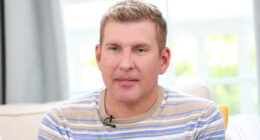My mother is too hands-on with our first baby – how can I tell her to leave us alone?
You need to set some boundaries – be curious about the advice being offered, and ignore what’s not needed

My partner and I recently became first-time parents. We are lucky to have both sets of grandparents to give hands-on support. This was particularly great when our baby was very young and everything felt like one big blur.
However, we’ve begun to find my mother’s presence increasingly taxing – yet feel guilty as we are also grateful for the support. Every time she is around she undermines our parenting by questioning or commenting on the way we do things. She does it in a playful manner which makes it difficult to object to, but she has also become anxious about the baby’s safety, often catastrophising.
We initially ignored it, then tried to justify what we do with research. This became tiring, so we now just roll our eyes. By the time she has left, we feel worn down – as if parenting a baby wasn’t hard enough!
I have tried raising this with her, and she was apologetic but then instantly commented on the baby’s bedtime routine.
I’ve planned to have another conversation with her but I worry about hurting her feelings. Still, it’s got to the point that having her around is more emotionally taxing than helpful. The baby is the main focus of her life as she doesn’t have many other hobbies/interests/social engagements – and we don’t want to deny her time with her grandchild. But sometimes I want to tell her to leave us alone! Any advice on how to approach this with my mother?
Gratitude and guilt can tether us to some unhealthy behaviours. That said, I also feel for your mum in this: it sounds like she was really useful at the beginning but is now more of an irritation. That may be confusing for her.
When a baby is born, especially if it’s the first in the family, everything shifts – and not just for the new parents. People’s status changes from parent to grandparent can stir up a lot of buried emotions; often this has very little to do with the actual baby.
What sort of mother was your mother? Does she see this as her chance to do things differently? Does she see her value in what she can do for people, and being needed? Perversely, it may feel to her that you no longer need her now that you are a parent yourself. What’s your dad’s perspective?
READ RELATED: ‘Just devastating’: the rarely discussed virtual taboo of losing a baby
Everyone offers advice with a new baby – and it can be maddening – but it’s their way of being involved. I found the best thing to do is be curious, then ignore what’s not needed. Avoid getting into quoting research: it can sound like you’re saying they did it wrong.
Family psychotherapist Nicola McCarry wondered if “taking care of your mum’s feelings” has been a pattern growing up, and maybe this is why you’re thinking so much about them. She also pointed out that as you’ve already tried to raise this with your mum, you may need to set some boundaries.
You need to decide where to draw the line. Try to work out exactly why you find this situation is so upsetting, and what emotions it’s bringing up.
When you’re ready to talk, McCarry recommends “preparing yourself so your tone is how you’d like it to be – maybe even put together a script so your thoughts are ordered and organised. And remember that when we get anxious, we [tend to] fight, flight, appease, so it’s not the best time to have a conversation.”
She suggested also asking your mum: “I’ve noticed you feel anxious, how are you coping, what’s going on?” New babies mean new bonds are formed but it can also be a time of old hurts coming up.
But also remember that things change quickly at this stage of new parenthood. So how it is now is not how it will be in a year, or even a few months.
Every week Annalisa Barbieri addresses a family-related problem sent in by a reader. If you would like advice from Annalisa on a family matter, please send your problem to [email protected]. Annalisa regrets she cannot enter into personal correspondence. Submissions are subject to our terms and conditions.
Comments on this piece are premoderated to ensure the discussion remains on the topics raised by the article. Please be aware that there may be a short delay in comments appearing on the site.
Source: Health & wellbeing | The Guardian





